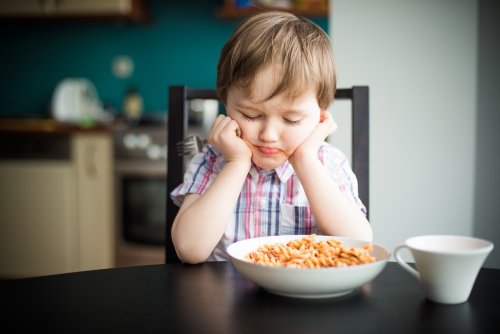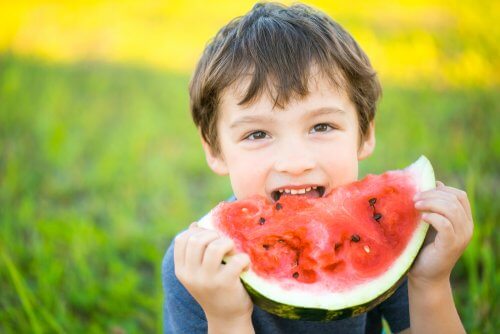What to Do When a Child Doesn't Want to Eat


Written and verified by the nutritionist Eliana Delgado Villanueva
You’ve tried everything, but you simply end up coming to the conclusion: “My child doesn’t like to eat.” Why is it happening? Could it be that your child has a problem? Or could it be a consequence of your family’s traditions and culture surrounding food? Keep reading to find out why children often have problems with food.
Why doesn’t my child eat?
If your child doesn’t like to eat, it’s very likely you’re worried. And that’s not unreasonable. If a child doesn’t eat well, they can’t develop properly. In fact, children who don’t eat well are more vulnerable to the environmental factors that trigger many infectious diseases.
All the same, this situation tends to be common in young children and preschoolers. Why is this? As they grow up, children demand more independence and want to eat by themselves. In addition, this fact is related to changes in appetite.
Thus, they may get fussy about food, eat slowly, want to consume only the same foods or, simply, not want to eat.
Fortunately, these adjustments are normal and last a short time. According to information compiled in the magazine Psicología Clínica con Niños y Adolescentes, 25 children out of every 100 have feeding problems under normal conditions. So don’t worry: your case is not the only one.
Signs and risk factors
Although there are certain stages in which children will not want to eat, you must take care that this situation doesn’t become a more serious problem. For this reason, we will share the following symptoms that indicate warning signs in your child’s health:
- Weight loss or low weight
- Irregular growth
- Nutritional deficiencies
- Inadequate psychological development
In summary, you should pay special attention to two important parameters: frequency and duration as well as the number and magnitude of the episodes. If you notice important changes, don’t hesitate to go to your doctor to get professional care.
“Eating is a behavior and all behaviors as such can be modified.”
-Estivill and Domènech, 2011-
Reasons why a child doesn’t like to eat

The fact that your child refuses to eat can be due to several factors. A study in Pediatric Reports found that these factors include personality characteristics, overall health, and food education.
At the same time, it’s important to consider information regarding the parents. This is because the parents’ behaviors and nutritional habits almost always have an impact on the children’s behavior. For example, some of the parental factors that affect the children are:
- Educational skills
- Knowledge about diet
- The couple’s relationship
- Their physical and emotional state
What you can do if your child doesn’t like to eat
Establish set meal times
It’s vital for a child that you give him or her three meals and two snacks each day at the same time every day. If you stick to a schedule with discipline, it’s almost certain that your little one will have an appetite at lunchtime.
Also, it’s important that you establish a time limit for eating. In fact, dedicating 20 minutes is enough for a child to consume the corresponding foods.
Don’t force them to eat
Sometimes, out of desperation, parents prepare special meals or force children to eat.
- If your child does not like to eat, it’s more effective to wait until the next meal. Then, they’ll be hungry.
- If you push it, you’ll create a tense atmosphere and relationship between you both
Use incentives
It’s been proven that the so-called “token economy” has good results. This technique increases the child’s motivation and receptivity to trying new foods.
- What’s more, it encourages your little one to eat in less time and consume all the food. Why don’t you try it out?
Eat together
A good part of dietary education is that the family eats together peacefully whenever possible. Eating together without stress and arguments will help your little one enjoy mealtime.
- This habit is being lost due to modern work life, and it can affect the health of the whole family
Read about the Consequences of an Imbalanced Diet: Foods that Lead to Tiredness
Other guidelines

An article from Paediatrics and Child Health offers some advice about how to improve your child’s eating habits:
- Offer your child different foods. Try to give them new foods one at a time. You may need to try every 15 or 20 times to achieve this. Therefore, you must have patience and perseverance.
- Teach them about good eating habits. Part of your child’s psychological education for adopting a good diet is to show him or her the importance of eating well to stay in good health.
- Let children help you in the kitchen
- Make food fun. Use cookie cutters, make faces out of food, or any other idea that serves to make food seem attractive to your child and get them excited about new foods.
- Avoid giving or taking away food as a reward or punishment for your child
- Your little one should eat whatever you prepared. However, it’s good to include at least one food they like along with the other dishes.
- Make sure they don’t satisfy their hunger with milk, juice, or sweetened drinks between meals
- Serve appropriate portions according to your child’s age
- When shopping, let children choose healthy foods that they want to eat
- Acting as an example is vital. Showing your child that you eat healthy and varied foods invites him to do the same.
In conclusion
Remember: if your child does not like to eat, you should not force him or her. Children often only eat when they’re hungry and stop eating once they’re full.
On the other hand, your main task is to provide your child with a good variety of healthy foods that they can choose from and decide how much to eat or even not to eat. We hope these tips help you improve eating behaviors at home.
All cited sources were thoroughly reviewed by our team to ensure their quality, reliability, currency, and validity. The bibliography of this article was considered reliable and of academic or scientific accuracy.
- Leung AK, Marchand V, Sauve RS; Canadian Paediatric Society, Nutrition and Gastroenterology Committee. The ‘picky eater’: The toddler or preschooler who does not eat. Paediatr Child Health. 2012;17(8):455–460. doi:10.1093/pch/17.8.455
- Fisher, J. O., Wright, G., Herman, A. N., Malhotra, K., Serrano, E. L., Foster, G. D., & Whitaker, R. C. (2015). “Snacks are not food”. Low-income, urban mothers’ perceptions of feeding snacks to their preschool-aged children. Appetite. https://doi.org/10.1016/j.appet.2014.09.007
- Draxten, M., Fulkerson, J. A., Friend, S., Flattum, C. F., & Schow, R. (2014). Parental role modeling of fruits and vegetables at meals and snacks is associated with children’s adequate consumption. Appetite. https://doi.org/10.1016/j.appet.2014.02.017
- Guía de Nutrición Familiar. (2011). La Alimentación se los Niños Y Jóvenes En Edad Escolar. Guía de Nutrición Familiar.
- Benjasuwantep B, Chaithirayanon S, Eiamudomkan M. Feeding problems in healthy young children: prevalence, related factors and feeding practices. Pediatr Rep. 2013;5(2):38–42. Published 2013 Jun 13. doi:10.4081/pr.2013.e10
This text is provided for informational purposes only and does not replace consultation with a professional. If in doubt, consult your specialist.








